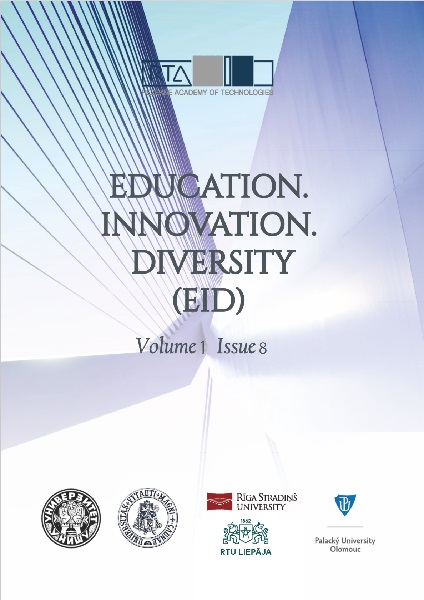DAILY LIFE CONTEXT BASED DIDACTIC GAMES IN MATHEMATICS LESSONS TO DEVELOP MATHEMATICAL COMPETENCE
DOI:
https://doi.org/10.17770/eid2024.1.7938Keywords:
daily life context based didactic games, mathematics, student, real-life problem situations, problem-solving skills, mathematical competenceAbstract
The results of the national centralised examination of Latvia show a lack of students` mathematical knowledge, skills and competences, which can have a negative impact not only on the direction of education in future, but on students` career choice as well, which makes an impact on the number of specialists in STEM (Science; Technology; Engineering; Mathematics) field professions. Employers highlight that a lack of mathematics skills is one of the major barriers to long-term investments in science, technology, engineering, and mathematics. Consequently, the use of appropriate and varied teaching methods, e.g. integrating real-life problem situations through daily life context based didactic games into the mathematics learning process becomes important. Daily life context based didactic games provide more realistic understanding of everyday situations and examples that lead to more effective and meaningful learning of mathematics. The aim of the research is to investigate and clarify the importance of integrating real-life problem situations through daily life context based didactic games in mathematics learning to improve mathematical competence. Theoretical research methods and empirical research methods (student surveys and teacher interviews), data processing and analysis methods (quantitative, graphical data representation, data analysis) are used in the research. The analysis of the student questionnaire highlights that students do not understand the importance of mathematics in everyday life as well as have difficulties explaining the meaning of mathematical competence. While teacher interviews reveal teachers' opinions about the problems of mathematics in everyday life and the possibility of using mathematics to solve everyday problems.
References
Blum, W., Galbraith, P. L., Henn, HW., & Niss, M. (eds) (2007). Modelling and applications in mathematics education: the 14th ICMI study. New ICMI Study Series, Volume 10, 337-340. DOI: https://doi.org/10.1007/978-0-387-29822-1_59
Brīvība-Dzenuška, L. (2018). Pieaugušo uzdevums – veicināt bērnu interesi par matemātiku. Retrieved from https://www.delfi.lv/bizness/versijas/laura-briviba-dzenuska-pieauguso-uzdevums-veicinat-bernu-interesi-par-matematiku.d?id=50517075
Burceva, R., & Graznova, G. (2019). Spēļu izmantojums literāro darbu ētisko vērtību apguvē sākumskolā. Retrieved from: https://journals.rta.lv/index.php/ER/article/view/4368/4372
Cooper, B., & Harries, T. (2002). Children’s use of realistic considerations in problem solving: some English evidence. The Journal of Mathematical Behavior, Volume 22, Issue 4, 449-463. DOI: https://doi.org/10.1016/j.jmathb.2003.09.004
Cotič, N., Cotič, M., Felda, D., & Krmac, N. (2021). The effect of cross-curricular integration on pupils’ knowledge gained through experiential learning, Cypriot Journal of Educational Sciences, Vol. 16, No. 6, 3133-3146. Retrieved from https://files.eric.ed.gov/fulltext/EJ1321531.pdf
Ersen, Z., B. & Ergul, E. (2022). Trends of game-based learning in mathematics education: A systematic review. International Journal of Contemporary Educational Research, 9(3), 603 - 623. DOI: https://doi.org/10.33200/ijcer.1109501
European Commission. (2007). Key competences for lifelong learning. Luxembourg: Office for Official Publications of the European Communities.
Dukurs, K., & Mencis, J. (1965). Aritmētikas metodika. Rīga: Liesma.
Eurydice. (2011). Mathematics Education in Europe: Common Challenges and National Policies (pp. 157.- 191.), England, Education, Audiovisual and Culture Executive Agency. Retrieved from https://ncm.gu.se/media/ncm/dokument/EN_Math_highlights.pdf
Eurydice. (2012). Matemātikas izglītība Eiropā: kopīgie izaicinājumi un valstu rīcībpolitika, Retrieved from https://publications.europa.eu/resource/cellar/3532f22d-eea2-4bb2-941b-959ddec61810.0008.02/DOC_1
Hegediš, P. J., & Hus. V. (2020). Global Perspectives on Gameful and Playful Teaching and Learning, Retrieved from https://www.igi-global.com/dictionary/didactic-game/80203
Helmane, I. (2006). Skolēnu matemātisko prasmju apguves un emociju mijsakarība. Rīga: Latvijas Universitāte.
Izglītības un zinātnes ministrija. (2020). Pētījums priekšnosacījumi sekmīgai pārejai no pirmsskolas izglītības uz sākumskolas izglītību, tostarp iekļaujošās izglītības principa īstenošanai, Retrieved from https://www.izm.gov.lv/lv/media/11465/download
Levine, S., C., & Pantoja, N. (2021). Development of children’s math attitudes: Gender differences, key socializers, and intervention approaches. Developmental Review, 62, Article 100997. DOI: https://www.izm.gov.lv/lv/media/11465/download
Nelson, T., O., & Narens, L. (1994). Why investigate metacognition? In J. Metcalfe &A. P. Shimamura (Eds.), Metacognition: Knowing about knowing (pp. 1–25). Cambridge, MA: The MIT Press.
Nugraheni, P., L., & Marsigit M. (2021). Realistic mathematics education: An approach to improve problem solving ability in primary school, Journal of Education and Learning, Vol. 15, No. 4, 511 - 518, DOI: https://doi.org/10.11591/edulearn.v15i4.19354
OECD. (2019). Skills Strategy Latvia. Retrieved from https://www.oecd.org/skills/centre-for-skills/OECDSkillsStrategyLatviaReportSummaryEnglish.pdf
Ojose, B. (2011). Mathematics Literacy: Are We Able To Put The Mathematics We Learn Into Everyday Use?. Journal of Mathematics Education, Vol. 4, No. 1, 89-100, Retrieved from https://educationforatoz.com/images/8.Bobby_Ojose_--_Mathematics_Literacy_Are_We_Able_To_Put_The_Mathematics_We_Learn_Into_Everyday_Use.pdf
Pipere, A. (2016). Primāro datu ieguves metodes. No: K. Mārtinsone, A. Pipere (red). Ievads pētniecībā: stratēģijas, dizaini, metodes. (212.-277.lpp.). Rīga: RaKa.
Skola2030. (2020). Matemātika II, Padziļinātā kursa programmas paraugs vispārējai vidējai izglītībai, Retrieved from https://mape.skola2030.lv/resources/9482
Skola2030. (2020). Matemātika 1.-9. klasei, Mācību priekšmeta programmas paraugs, Retrieved from https://mape.skola2030.lv/resources/159
Tobias, S., & Weissbrod, C. (1980). Tobias, S., & Weissbrod, C. Anxiety and mathematics: An update. Harvard Educational Review, 50(1), 63–70. DOI: https://psycnet.apa.org/doi/10.17763/haer.50.1.xw483257j6035084
Valsts izglītības satura centrs. (2023). Matemātika 1.-9. klasei, Mācību priekšmeta programmas paraugs, Retrieved from https://mape.gov.lv/catalog/materials/AAAB8194-FF4F-4A89-835F-2DCBC1611D24/view?preview=AAAB8194-FF4F-4A89-835F-2DCBC1611D24
Vankúš, P. (2005). Efficacy of teaching mathematics with method of didactical games in a–didactic situation. Quaderni di Ricerca in Didattica, 90-105 DOI: 10.13140/2.1.4908.3841
Vankúš, P. (2012). Didatic games in mathematics. KEC FMFI UK: Bratislava
Downloads
Published
Issue
Section
License
Copyright (c) 2024 Education. Innovation. Diversity.

This work is licensed under a Creative Commons Attribution 4.0 International License.






